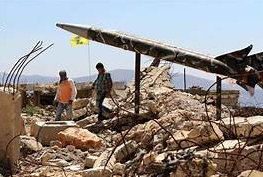This invasion is only a route to further entanglement.
The killing of Hezbollah leader Hassan Nasrallah was a fearsome exhibition of Israeli intelligence and martial efficiency – as well as of Hezbollah complacency. But as tanks mass on the Lebanese border and the bombs fall on Beirut in what US officials believe will be a limited invasion, Israel is not marching towards a decisive victory, but further entanglement. And the incident captures Israel’s perennial incapacity in this conflict. In the year since October 7, Israel’s military has demonstrated its tremendous capacities for industrial destruction and technical assassination. It has simultaneously failed to achieve any strategic objectives – all while driving the region it calls home to the edge of war.
Nasrallah, who had been on Israel’s target list for years – they tried to bomb him on three occasions in 2006 alone – appears to have judged that Hezbollah could continue pressuring Israel to end its war in Gaza by firing rockets into its northern region without restraint. Though Israel’s retaliatory strikes on southern Lebanon far exceeded Hezbollah’s in number and lethality, Nasrallah may have considered that a price worth paying. As in Gaza, he expected that the deaths and displacement of Lebanese civilians would provoke international condemnation and eventually compel Israel to end the war against Hamas, perhaps under pressure from a Biden administration worried about a wider war in the Middle East.
Israel’s military capacity to wreak havoc is undeniable, but the cost is rising. Every time it strikes, it deepens its entanglement in a broader regional conflict. The sheer scale of Israel’s military operation, combined with a lack of clear strategic objectives, underscores a fundamental flaw: Israel has not been able to translate its military successes into lasting political solutions. Instead, it faces a growing humanitarian crisis that only fuels the conflict further.
The cycle of violence perpetuates itself. Nasrallah and Hezbollah understand that Israel’s heavy-handed tactics often result in increased sympathy for their cause, while Israel remains stuck in a pattern of military retaliation that further escalates tensions. The core issue – a resolution to the conflict with Hamas and the broader Palestinian question – remains unaddressed. The longer Israel’s military remains bogged down in Lebanon, the more likely it is that the regional instability will spread.
Rather than advancing toward a victory, Israel is falling deeper into the quagmire of a conflict that offers no easy or clear resolution. The situation in Lebanon is not a path toward decisive military success but a continuation of a cycle that only deepens the entanglement. Israel must reconsider its approach to the broader Middle East, lest it fall into the trap of perpetual warfare that achieves little but further destabilization.
The prospect of a lasting peace in the region is growing more remote as Israel’s actions exacerbate tensions with its neighbors. Hezbollah’s ability to engage in asymmetric warfare, coupled with the broader regional dynamics, suggests that Israel’s military strategy is unsustainable in the long term. Ultimately, victory in Lebanon seems as elusive as ever, and the region stands on the brink of further conflict with no end in sight.

